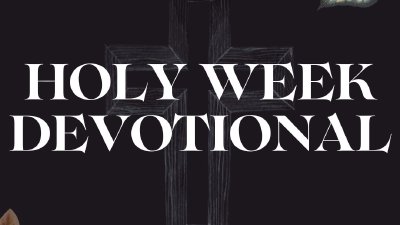Opening
Let's begin with a moment of silence, centering our minds, bodies, and hearts upon the Lord our God.
Quote
“The beginning of evils is distraction.” -Abba Poemen
Reflection
The Monday of Holy Week can feel like the week’s trajectory has crashed and burned. In many churches, there is typically a lot of hoopla around Palm Sunday: processing with palm branches, special hymns and music, and long, dramatic readings of the Passion narrative. Often, the special services and church-led devotional practices will not pick back up again until Maundy Thursday. Thus, for the next few days, we may feel spiritually adrift.
As it happens, there is a great deal to do. Now is the time for preparation, and there is important work to be done. Though Lent can seem long, Holy Week can still sneak up on us. On Monday, we may realize that we do not feel wholly prepared to bear witness to Christ’s trial, scourging, crucifixion, and death. What does it mean for us to bear the responsibility for these acts, to recognize that these are the wages of our sin, as St. Paul writes, but that they are being paid in full by another? In our daily lives, we dig our own graves, but Christ lifts us out of that pit by being lifted high on a cross.
Yes, there is much to reckon with in this last week of Lent. One way to begin is by taking an uncompromising look at our priorities, particularly in this holiest of weeks. What are we valuing most by giving it most of our time and attention? Are we entering Holy Week distracted and overextended? Let us prepare for the rest of Holy Week by clearing our minds and calendars with all that is not strictly necessary. Jesus died for our whole selves, and these selves must be present to bear witness to that sacrifice.
Prayer
Almighty God, whose dear Son went not up to joy but first He suffered pain, and entered not into glory before He was crucified: Mercifully grant that we, walking in the way of the cross, may find it none other than the way of life and peace through Jesus Christ your Son our Lord, who lives and reigns with you and the Holy Spirit, one God, forever and ever. Amen.
Reflective Practice
Read and listen to John 12:1-11. Consider Jesus’ condemnation of Judas’s financial priorities. How can these lessons apply to the priorities in your own life? What adjustments could you start to make this week to more fully orient your time and treasure to the worship of Jesus Christ?
Read
John 12:1-11 - Six days before the Passover, Jesus came to Bethany, where Lazarus lived, whom Jesus had raised from the dead. 2 Here a dinner was given in Jesus’ honor. Martha served, while Lazarus was among those reclining at the table with him. 3 Then Mary took about a pint of pure nard, an expensive perfume; she poured it on Jesus’ feet and wiped his feet with her hair. And the house was filled with the fragrance of the perfume.
4 But one of his disciples, Judas Iscariot, who was later to betray him, objected, 5 “Why wasn’t this perfume sold and the money given to the poor? It was worth a year’s wages.” 6 He did not say this because he cared about the poor but because he was a thief; as keeper of the money bag, he used to help himself to what was put into it.
7 “Leave her alone,” Jesus replied. “It was intended that she should save this perfume for the day of my burial. 8 You will always have the poor among you, but you will not always have me.”
9 Meanwhile a large crowd of Jews found out that Jesus was there and came, not only because of him but also to see Lazarus, whom he had raised from the dead. 10 So the chief priests made plans to kill Lazarus as well, 11 for on account of him many of the Jews were going over to Jesus and believing in him.




